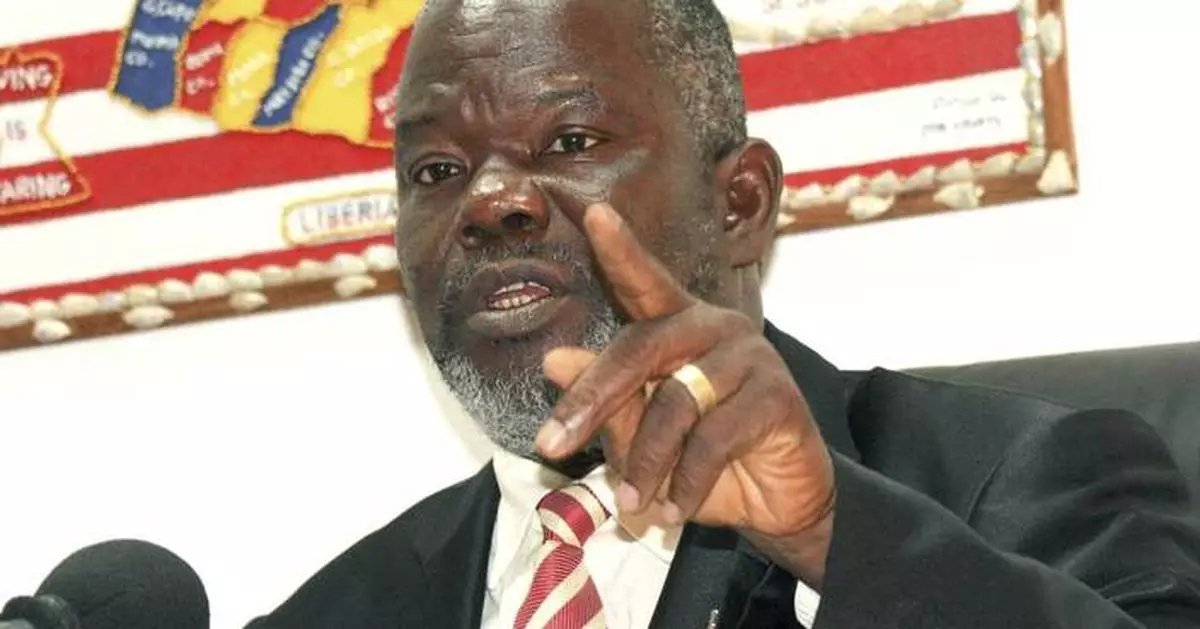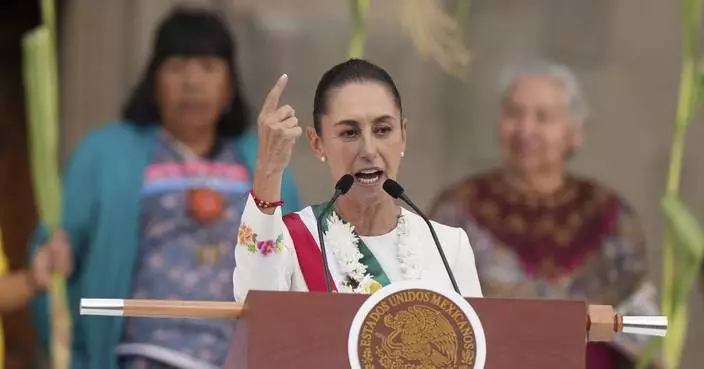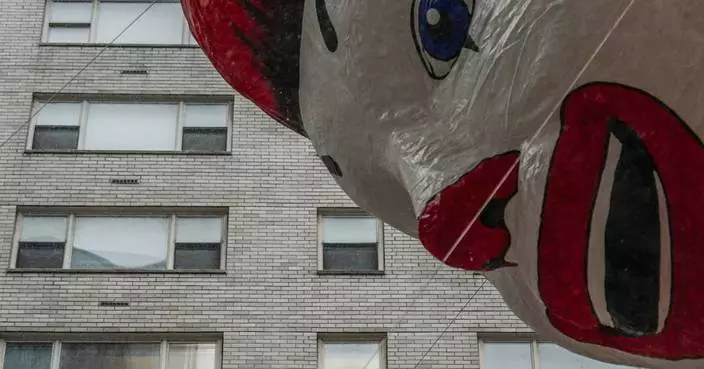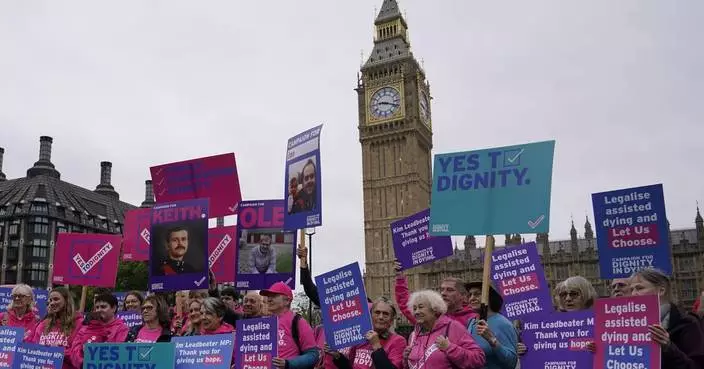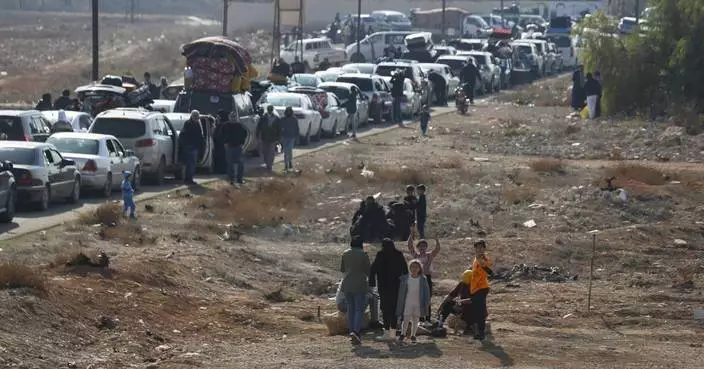MONROVIA, Liberia (AP) — Prince Johnson, the Liberian former warlord and senator whose brutal tactics shocked the world, has died at the age of 72, authorities said Thursday.
Johnson, who infamously videotaped himself drinking Budweiser as his men cut off the ears of the nation’s former president, remained active in politics after the civil war ended and was elected senator in 2006.
He died on Thursday at a local hospital in Paynesville, a suburb of Monrovia, said Siafa Jallah, deputy director of press relations at the Liberian senate.
Liberia's civil wars, marked by mass killings, torture and sexual violence, killed an estimated 250,000 people between 1989 and 2003. Johnson was named one of the “most notorious perpetrators” by the country's post-war truth and reconciliation committee, and was accused of killing, extortion, massacre, torture and rape among other charges.
Neither Johnson nor the other seven people that the committee listed as leaders of warring factions were ever tried in Liberia. But a handful were convicted overseas, including Charles Taylor, a former president, who is serving a 50-year-sentence in the United Kingdom.
Mohammed Jabbateh, a rebel commander who witnesses said sliced a baby out of a pregnant woman’s stomach, killed civilians and ordered his soldiers to rape young girls, was sentenced to 30 years in the U.S.
Earlier this year, President Joseph Boakai signed an executive order to create a long-awaited war crimes court to deliver justice to the civil wars' victims, but the court hasn't begun operating.
Adama Dempster, a Liberian human rights advocate, expressed regrets that Johnson was unable to testify before the proposed tribunal before he died. “It’s sad and has a deep meaning for an accountability process,” he said.
In 1990, the then-38-year-old Johnson led a rebel faction that invaded Monrovia, captured former President Samuel Doe and tortured him in front of a rolling camera. Johnson is seen kicking back in a chair, his feet up on a table and a bottle of beer in one hand. He taunts the former ruler as his men strip the president to his underwear then cut off his ears, as blood streams down his temple. The president later died, and according to one witness’ testimony in front of the nation’s truth and reconciliation commission, Johnson later showed off Doe’s head on a platter.
Around the same time, Johnson executed a relief worker wearing a Red Cross bib after accusing him of profiteering from rice sales. An Associated Press photographer who witnessed the scene reported the crumpled victim briefly lifted his head and asked “Why, why?” before Johnson finished him off with a burst of AK-47 fire.
After the end of the war, Johnson became a born-again Christian and ordained preacher, before being elected senator representing Nimba County. The country banned the sale of Doe's notorious torture tape that had once been widely available at streetside stalls.
Follow AP’s Africa coverage at: https://apnews.com/hub/africa

FILE - In this photo taken Wednesday Feb. 17, 2010, Liberian Senator Prince Johnson, gestures during an interview in Monrovia, Liberia. (AP Photo, File)
HANOUIYEH, Lebanon (AP) — During their 37 years of marriage, Mariam Kourani and her husband ran a butcher shop in southern Lebanon, started a business selling serving containers and opened a small restaurant.
An Israeli airstrike in late September destroyed it all.
Walking through the rubble of what used to be her house and restaurant in the village of Hanouiyeh, Kourani, 56, watched as her son-in-law picked up some of his young daughter's clothes and toys from the ruins.
“This was my house, my dreams and my hard work,” she said, holding back tears. She pointed to one of the serving containers she used to sell, and estimated her family’s total losses at $120,000.
Kourani is among the tens of thousands of residents who have started streaming back into southern Lebanon to check on their homes after the U.S.-mediated ceasefire between Israel and Hezbollah went into effect early Wednesday. Intense Israeli airstrikes over the past two months leveled entire neighborhoods in eastern and southern Lebanon, and in the southern suburbs of Beirut, which are predominantly Shiite areas of Lebanon where Hezbollah has a strong base of support. Nearly 1.2 million people have been displaced.
Like Kourani, many are returning home to find that their homes are gone.
The World Bank said earlier this month that housing has been the hardest hit sector with almost 100,000 units partially or fully damaged during the 14-month war, which intensified in late September. It estimated the damage at $3.2 billion.
Who will pay for the reconstruction is unclear. Iran has offered to help, but it’s under Western sanctions and its economy has suffered. Kourani said Hezbollah members have told her those who lost a house during the war will be given a place to stay until their homes are rebuilt. After spending thousands of dollars in rent for the two months the family was displaced in the village of Qarnayel in Mount Lebanon, Kourani said her priority is to fix their butcher shop across the street so they can start earning money.
“We are starting from below zero,” she said.
Ali Saleh lost his home in 2006, during the 34-day war between Israel and Hezbollah. He was able to rebuild when the gulf nation of Qatar funded the reconstruction of several areas in southern Lebanon.
On Wednesday, Saleh drove to his hometown near the border with Israel, only to find that it had happened again: his two-story home was gone.
“All the memories are gone,” he said, as he smoked a cigarette.
The 59-year-old man drove back with his wife and three of his six children hoping to find a place to stay close to his hometown of Aita al-Shaab, a village that witnessed some of the most intense fighting.
“It is a disaster-stricken village,” he said.
In the ancient city of Baalbek in eastern Lebanon, 34-year-old Souad al-Outa walked around what was left of her home, shocked.
She knew her neighborhood had been badly hit like many other parts of this city, a designated UNESCO World Heritage site famous for its ancient Roman ruins. She was not prepared for the devastation she saw when she went back on Thursday.
A strike earlier this month killed multiple people in the street nearby, she said, including several of her husband's relatives.
“I feel like my heart has come out of its place,” she said as she looked around what used to be her children’s bedroom.
“We had a beautiful life here.”
About 170 kilometers (105 miles) southwest of there, in the village of Qana near the port city of Tyre, Abu Ahmad Salameh stood in what was left of several buildings that belonged to his family. He was able to pull two carpets from under the rubble.
“All this damage can be rebuilt. This is our land and we will stay here no matter what,” Salameh said. “It is painful to see the destruction. These are the homes of my parents, grandparents, daughter and my house.”
He said that when the area was struck about two weeks ago, Hezbollah fighters found a safe full of jewelry and cash in the rubble of his house, and returned it to his family.
Back in Hanouiyeh, Kourani said the family left their home in the early afternoon on Sept. 23, the day the war intensified, and moved in with relatives a few miles away. Shortly after they got there, they received a call saying that their house had been destroyed.
As the Israeli airstrikes increased, they fled north to Qarnayel, where they rented an apartment for 1,000 a month in addition to $250 for electricity and water.
Once the ceasefire went into effect, she drove back home with her husband, son and her daughter’s family. They spent the night with relatives.
Despite everything, Kourani said she is embarrassed to speak about her material losses at a time when thousands of people have been killed, including friends and relatives and Hezbollah fighters among them.
“Israel has filled our land with blood. Our big loss is our men,” she said.
Associated Press writer Lujain Jo in Baalbek, Lebanon contributed reporting.

Safaa Haidous, carries her daughter Yara, 4, while walking on the rubble of her parents destroyed house after she returned to Hanouiyeh village, southern Lebanon, Thursday, Nov. 28, 2024 following a ceasefire between Israel and Hezbollah that went into effect on Wednesday.(AP Photo/Hussein Malla)

Mariam Kourani, 56, stands on her destroyed butcher shop after she returned with her family to Hanouiyeh village, southern Lebanon, Thursday, Nov. 28, 2024 following a ceasefire between Israel and Hezbollah that went into effect on Wednesday.(AP Photo/Hussein Malla)

Residents collect personal remains from their destroyed house after they returned to Chehabiyeh village, southern Lebanon, Thursday, Nov. 28, 2024 following a ceasefire between Israel and Hezbollah that went into effect on Wednesday.(AP Photo/Hussein Malla)

Ali Haidous carries a plastic bag with the remains of her family clothes, as he walks on the rubble of his destroyed house after he returned with his family to Hanouiyeh village, southern Lebanon, Thursday, Nov. 28, 2024 following a ceasefire between Israel and Hezbollah that went into effect on Wednesday.(AP Photo/Hussein Malla)

Ali Haidous, removes the debris from his destroyed butcher shop after he returned with his family to his village of Hanouiyeh, southern Lebanon, Thursday, Nov. 28, 2024 following a ceasefire between Israel and Hezbollah that went into effect on Wednesday.(AP Photo/Hussein Malla)

Mariam Kourani, 56, removes a toy car from the rubble on her destroyed house after she returned with her family to Hanouiyeh village, southern Lebanon, Thursday, Nov. 28, 2024 following a ceasefire between Israel and Hezbollah that went into effect on Wednesday. (AP Photo/Hussein Malla)

Safaa Haidous, carries her daughter Yara, 4, as she speaks with her husband Rawad Srour, who is stands on the roof of their family destroyed house, as they collect the remains of their belongings after they returned to Hanouiyeh village, southern Lebanon, Thursday, Nov. 28, 2024 following a ceasefire between Israel and Hezbollah that went into effect on Wednesday.(AP Photo/Hussein Malla)

Mariam Kourani, 56, and her husband Ali Haidous, stand on the rubble of their destroyed house after they returned to their village of Hanouiyeh , southern Lebanon, Thursday, Nov. 28, 2024 following a ceasefire between Israel and Hezbollah that went into effect on Wednesday.(AP Photo/Hussein Malla)

Yara Srour, 4, holds her photo album, as she sits in front of her grandparents destroyed house after she returned with her family to Hanouiyeh village, southern Lebanon, Thursday, Nov. 28, 2024 following a ceasefire between Israel and Hezbollah that went into effect on Wednesday.(AP Photo/Hussein Malla)

Mariam Kourani, 56, sits on the rubble of her destroyed house after she returned with her family to Hanouiyeh village, southern Lebanon, Thursday, Nov. 28, 2024 following a ceasefire between Israel and Hezbollah that went into effect on Wednesday.(AP Photo/Hussein Malla)



